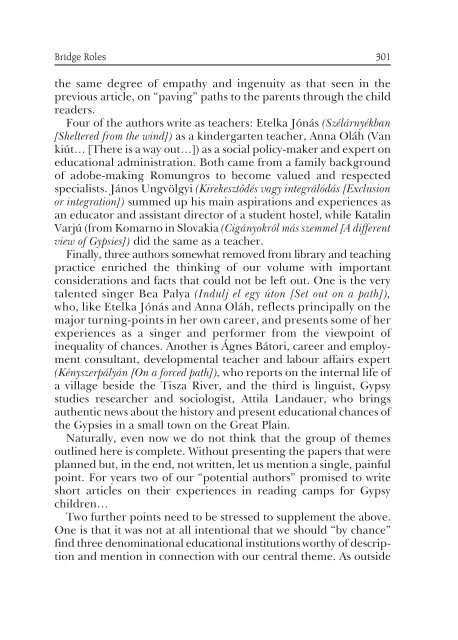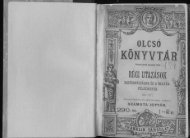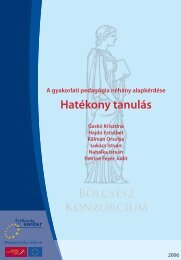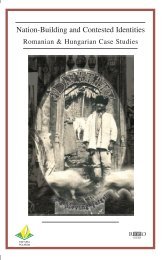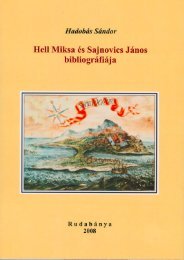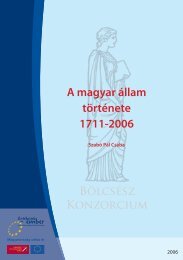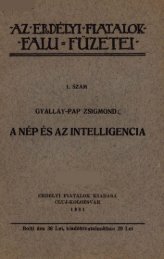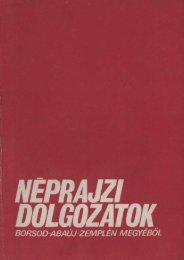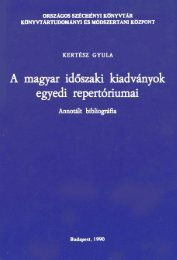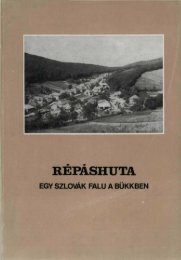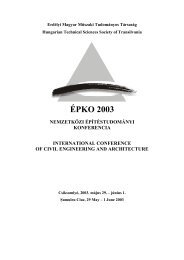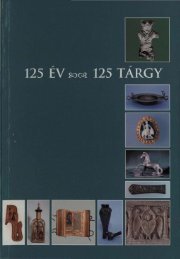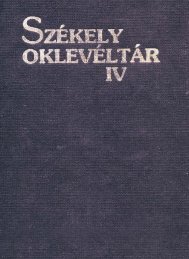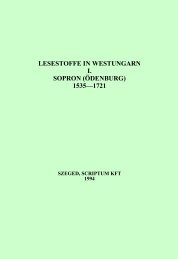- Page 1 and 2:
NEMZETI TÉKA SZERKESZTETTE NAGY AT
- Page 3 and 4:
JHÍDSZEREPEK
- Page 5 and 6:
jHídszerepek Cigány integrációs
- Page 7 and 8:
Tartalom Elõszó 7 Németh Judit K
- Page 9 and 10:
Elõszó Évtizedekkel korábban me
- Page 11:
Elõszó 9 kal, barátainkkal együ
- Page 14 and 15:
12 Németh Judit Könyvtárunk szer
- Page 16 and 17:
14 Németh Judit közelében olyan
- Page 18 and 19:
16 Németh Judit Pedagógiai szempo
- Page 20 and 21:
18 Németh Judit zású táborlakó
- Page 22 and 23:
20 Németh Judit ról, azokat is sz
- Page 24 and 25:
22 Németh Judit Tavaszi napos, mel
- Page 26 and 27:
24 Németh Judit Vannak diákok, ak
- Page 28 and 29:
26 Németh Judit giája az, amit P
- Page 31 and 32:
KARDOS FERENC Utak és keresztutak:
- Page 33 and 34:
Utak és keresztutak: az író, a k
- Page 35 and 36:
Utak és keresztutak: az író, a k
- Page 37 and 38:
Utak és keresztutak: az író, a k
- Page 39 and 40:
Utak és keresztutak: az író, a k
- Page 41 and 42:
Utak és keresztutak: az író, a k
- Page 43 and 44:
Utak és keresztutak: az író, a k
- Page 45 and 46:
Utak és keresztutak: az író, a k
- Page 47 and 48:
Utak és keresztutak: az író, a k
- Page 49 and 50:
Utak és keresztutak: az író, a k
- Page 51 and 52:
Utak és keresztutak: az író, a k
- Page 53 and 54:
Utak és keresztutak: az író, a k
- Page 55 and 56:
Utak és keresztutak: az író, a k
- Page 57 and 58:
Utak és keresztutak: az író, a k
- Page 59 and 60:
Utak és keresztutak: az író, a k
- Page 61 and 62:
Utak és keresztutak: az író, a k
- Page 63 and 64:
HEGEDÛS PÉTERNÉ „NINIVE” kö
- Page 65 and 66:
„NINIVE” könyvtári szakkör a
- Page 67 and 68:
„NINIVE” könyvtári szakkör a
- Page 69 and 70:
„NINIVE” könyvtári szakkör a
- Page 71 and 72:
„NINIVE” könyvtári szakkör a
- Page 73 and 74:
„NINIVE” könyvtári szakkör a
- Page 75 and 76:
„NINIVE” könyvtári szakkör a
- Page 77 and 78:
„NINIVE” könyvtári szakkör a
- Page 79 and 80:
„NINIVE” könyvtári szakkör a
- Page 81:
„NINIVE” könyvtári szakkör a
- Page 84 and 85:
82 Abonyiné Antal Anna Segítsége
- Page 86 and 87:
84 Abonyiné Antal Anna Volt olyan
- Page 88 and 89:
86 Abonyiné Antal Anna nem mûköd
- Page 90 and 91:
88 Abonyiné Antal Anna ményt megh
- Page 93 and 94:
VILLÁNYI RÓZSA A szív bölcsess
- Page 95 and 96:
A szív bölcsessége 93 Otthon any
- Page 97 and 98:
A szív bölcsessége 95 nél fonto
- Page 99 and 100:
A szív bölcsessége 97 küli, dö
- Page 101 and 102:
A szív bölcsessége 99 míg a fia
- Page 103 and 104:
A szív bölcsessége 101 Az eredet
- Page 105 and 106:
VARJÚ KATALIN Cigányokról más s
- Page 107 and 108:
Cigányokról más szemmel 105 A cs
- Page 109 and 110:
Cigányokról más szemmel 107 önt
- Page 111 and 112:
Cigányokról más szemmel 109 ben:
- Page 113 and 114:
Cigányokról más szemmel 111 ünn
- Page 115 and 116:
Cigányokról más szemmel 113 A m
- Page 117 and 118:
Cigányokról más szemmel 115 mat,
- Page 119 and 120:
Cigányokról más szemmel 117 Kér
- Page 121 and 122:
Cigányokról más szemmel 119 él
- Page 123:
Cigányokról más szemmel 121 Mint
- Page 126 and 127:
124 Oláh Anna san tudták, hogyan
- Page 128 and 129:
126 Oláh Anna még azt is mondta,
- Page 130 and 131:
128 Oláh Anna látni azt a fantasz
- Page 132 and 133:
130 Oláh Anna Azt hiszem a többs
- Page 134 and 135:
132 Oláh Anna hogy a nõ neveli a
- Page 136 and 137:
134 Oláh Anna elvisz az uram egy b
- Page 139 and 140:
UNGVÖLGYI JÁNOS Kirekesztõdés v
- Page 141 and 142:
Kirekesztõdés vagy integrálódá
- Page 143 and 144:
Kirekesztõdés vagy integrálódá
- Page 145 and 146:
Kirekesztõdés vagy integrálódá
- Page 147 and 148:
Kirekesztõdés vagy integrálódá
- Page 149 and 150:
Kirekesztõdés vagy integrálódá
- Page 151 and 152:
Kirekesztõdés vagy integrálódá
- Page 153 and 154:
Kirekesztõdés vagy integrálódá
- Page 155 and 156:
Kirekesztõdés vagy integrálódá
- Page 157 and 158:
PALYA BEA Indulj el egy úton! Kor
- Page 159 and 160:
Indulj el egy úton! 157 szóval be
- Page 161 and 162:
Indulj el egy úton! 159 A nyári t
- Page 163 and 164:
Indulj el egy úton! 161 Így tekin
- Page 165 and 166:
Indulj el egy úton! 163 de a mi sz
- Page 167 and 168:
Indulj el egy úton! 165 Szól a pa
- Page 169 and 170:
Indulj el egy úton! 167 közben ha
- Page 171 and 172:
Indulj el egy úton! 169 pelyhes”
- Page 173:
Indulj el egy úton! 171 felépíte
- Page 176 and 177:
174 Jónás Etelka volna bennünket
- Page 178 and 179:
176 Jónás Etelka nem hívták seh
- Page 180 and 181:
178 Jónás Etelka Elém jönnek sz
- Page 182 and 183:
180 Jónás Etelka Származásom el
- Page 184 and 185:
182 Jónás Etelka ságomból adód
- Page 186 and 187:
184 Jónás Etelka szép, olyan har
- Page 188 and 189:
186 Jónás Etelka váljék. Tehát
- Page 190 and 191:
188 Jónás Etelka Jónás Etelka e
- Page 192 and 193:
190 Bátori Ágnes biek esetében b
- Page 194 and 195:
192 Bátori Ágnes elsõként szoru
- Page 196 and 197:
194 Bátori Ágnes társadalom rend
- Page 198 and 199:
196 Bátori Ágnes nek a felnövõ
- Page 200 and 201:
198 Bátori Ágnes ház, jellemzõe
- Page 202 and 203:
200 Bátori Ágnes A ruhákat a gye
- Page 204 and 205:
202 Bátori Ágnes a munkavégzést
- Page 206 and 207:
204 Bátori Ágnes A HELYI ÉRTELMI
- Page 208 and 209:
206 Bátori Ágnes nító sok idõt
- Page 210 and 211:
208 Bátori Ágnes A CSALÁDSEGÍT
- Page 212 and 213:
210 Bátori Ágnes rossz nagyon, de
- Page 214 and 215:
212 Bátori Ágnes a gondolkodás f
- Page 217 and 218:
LANDAUER ATTILA K. BEVEZETÉS K. ma
- Page 219 and 220:
K. 217 községekhez tette hasonlat
- Page 221 and 222:
K. 219 exportra is gyártó - Vízg
- Page 223 and 224:
K. 221 dik világháború elõtt eg
- Page 225 and 226:
K. 223 teknõs vagy teknõvájó ci
- Page 227 and 228:
K. 225 ma 70 - konkrét eseményhez
- Page 229 and 230:
K. 227 mérvû nyelvvesztés után
- Page 231 and 232:
K. 229 egyetértett, hogy a városb
- Page 233 and 234:
K. 231 Ekkor - s ekkor talán tulaj
- Page 235 and 236:
K. 233 Az iskola 224 tanulójának
- Page 237 and 238:
K. 235 után megközelítõleg fél
- Page 239 and 240:
HARMAT JÓZSEF A Collegium Martineu
- Page 241 and 242:
A Collegium Martineum tíz éve 239
- Page 243 and 244:
A Collegium Martineum tíz éve 241
- Page 245 and 246:
A Collegium Martineum tíz éve 243
- Page 247 and 248:
A Collegium Martineum tíz éve 245
- Page 249 and 250:
A Collegium Martineum tíz éve 247
- Page 251 and 252: A Collegium Martineum tíz éve 249
- Page 253 and 254: A Collegium Martineum tíz éve 251
- Page 255 and 256: A Collegium Martineum tíz éve 253
- Page 257 and 258: A Collegium Martineum tíz éve 255
- Page 259 and 260: A Collegium Martineum tíz éve 257
- Page 261 and 262: A Collegium Martineum tíz éve 259
- Page 263 and 264: A Collegium Martineum tíz éve 261
- Page 265 and 266: A Collegium Martineum tíz éve 263
- Page 267 and 268: A Collegium Martineum tíz éve 265
- Page 269 and 270: A Collegium Martineum tíz éve 267
- Page 271 and 272: A Collegium Martineum tíz éve 269
- Page 273 and 274: A Collegium Martineum tíz éve 271
- Page 275 and 276: A Collegium Martineum tíz éve 273
- Page 277 and 278: A Collegium Martineum tíz éve 275
- Page 279 and 280: A Collegium Martineum tíz éve 277
- Page 281 and 282: A Collegium Martineum tíz éve 279
- Page 283 and 284: A Collegium Martineum tíz éve 281
- Page 285 and 286: A Collegium Martineum tíz éve 283
- Page 287 and 288: A Collegium Martineum tíz éve 285
- Page 289 and 290: A Collegium Martineum tíz éve 287
- Page 291 and 292: A Collegium Martineum tíz éve 289
- Page 293 and 294: A Collegium Martineum tíz éve 291
- Page 295 and 296: A Collegium Martineum tíz éve 293
- Page 297 and 298: A Collegium Martineum tíz éve 295
- Page 299 and 300: A Collegium Martineum tíz éve 297
- Page 301: Summary Bridge Roles (Questions of
- Page 305 and 306: Felhasznált irodalom Balogh 1994 B
- Page 307 and 308: Felhasznált irodalom 305 Varjú 20
- Page 309 and 310: A kötet szerzõi 307 portvezetõk
- Page 311 and 312: A NEMZETI TÉKA CÍMÛ SOROZAT EDDI
- Page 313 and 314: A Nemzeti téka az Országos Széch


